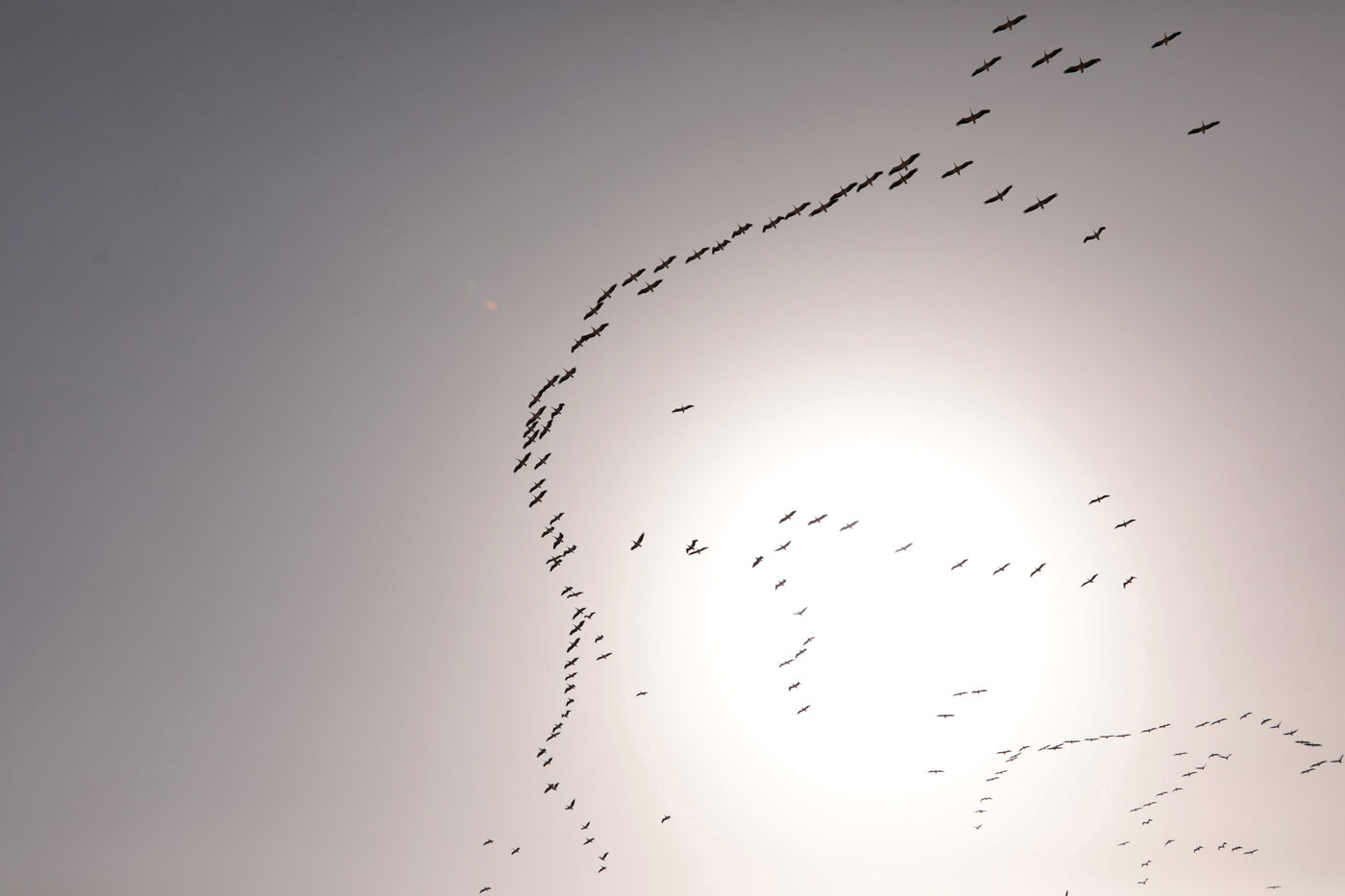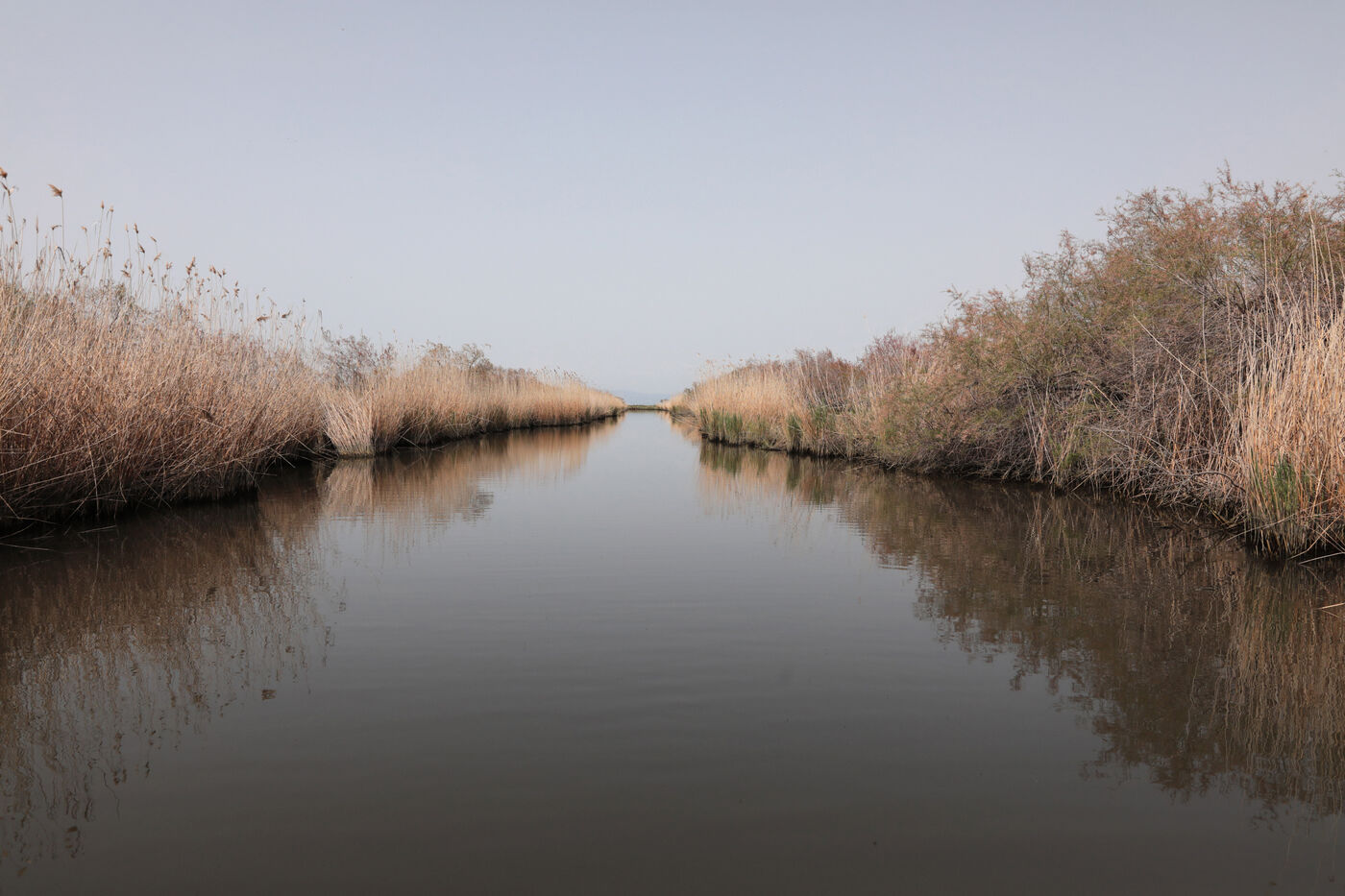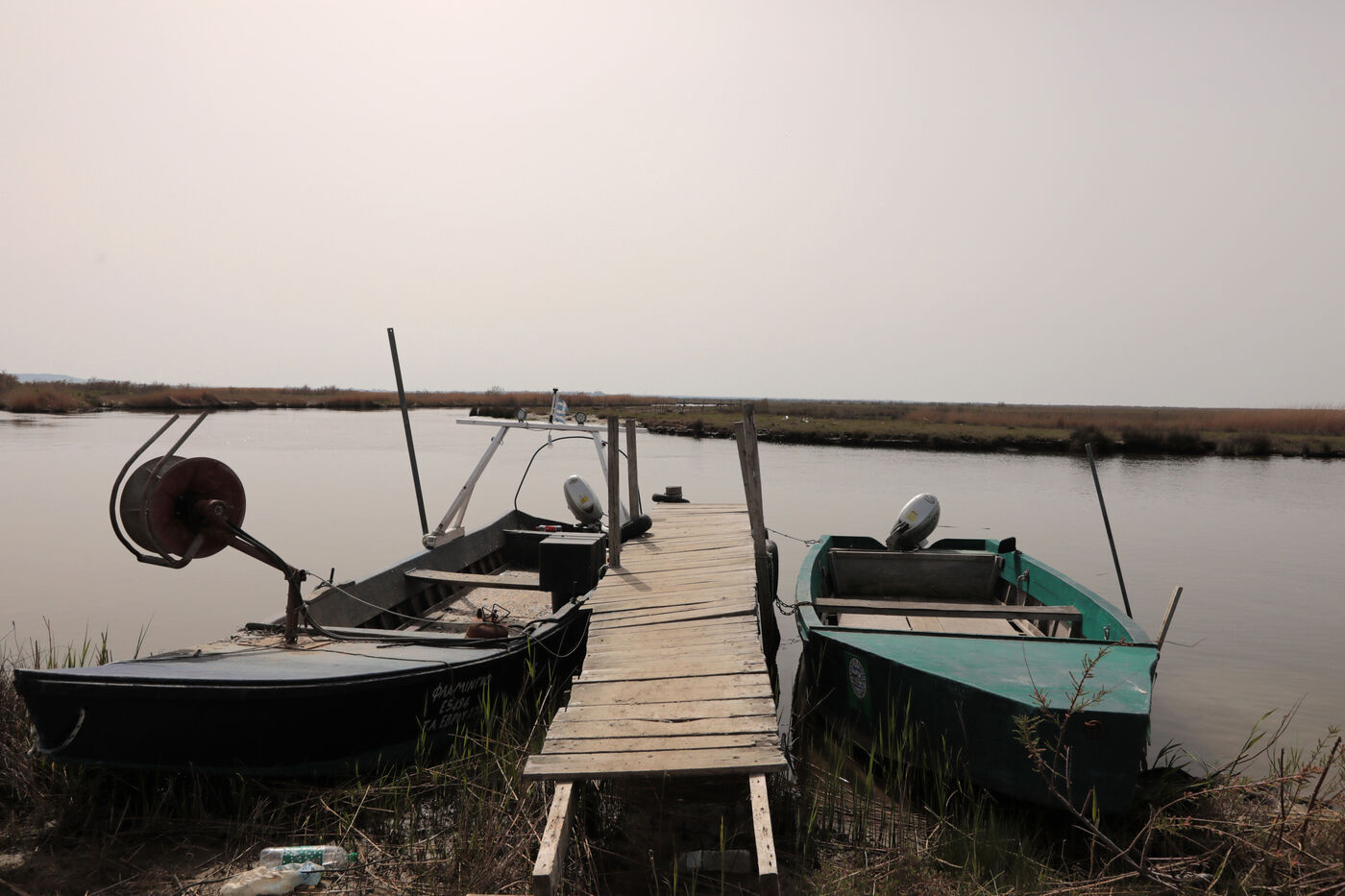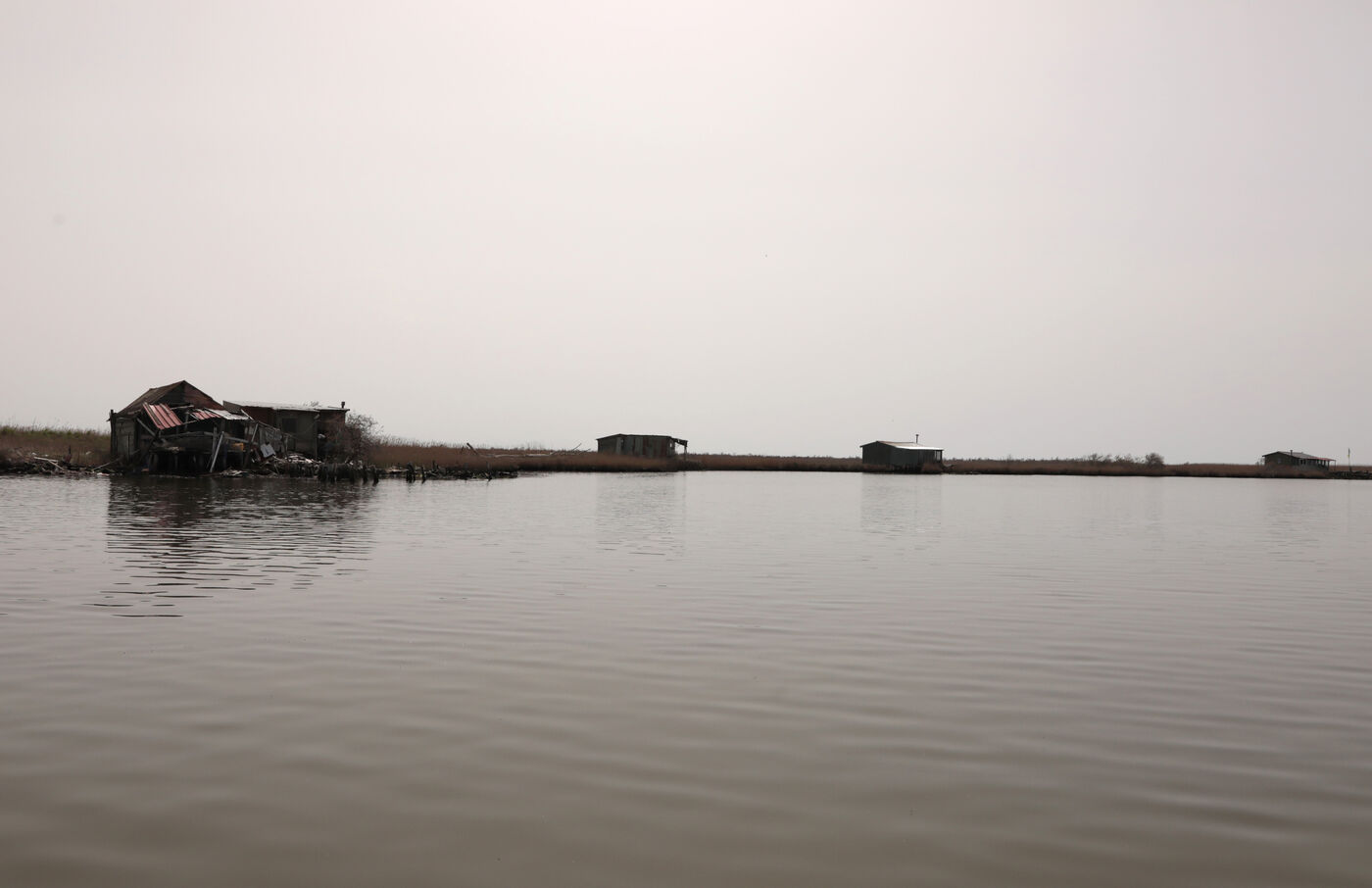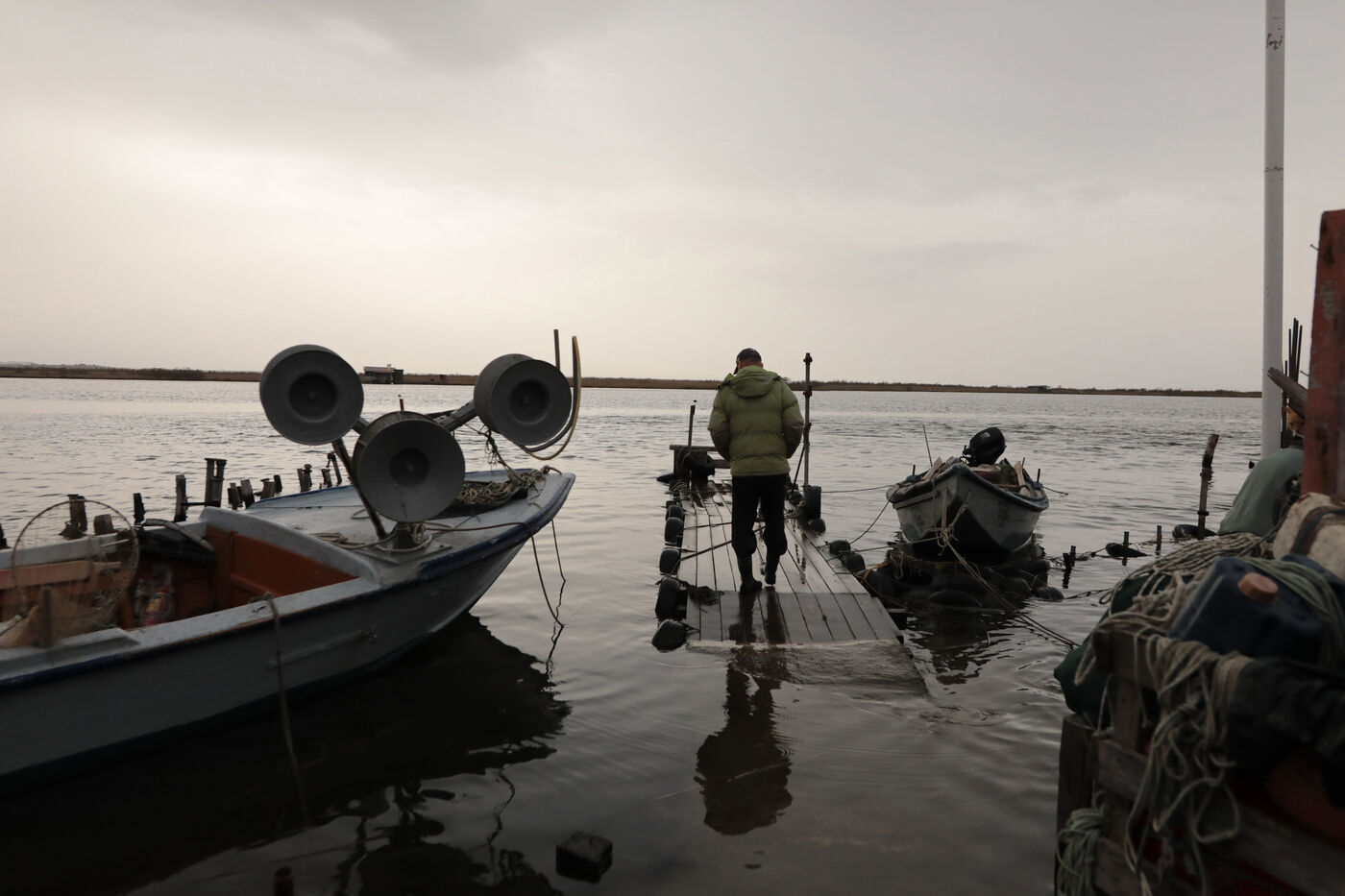Pour accéder à la série en entier, vous devez vous logger ou demander un compte Hans Lucas en cliquant ici.
La dame du Delta Evros, à la frontière de l'Europe
Sur les îlots éparpillés du fleuve Evros, une zone protégée pour sa bio diversité de 190 km2 du nord-est de la Grèce, des vaches vivent en autarcie. Dans le ciel, des pélicans blancs récemment arrivés d Afrique du nord volent en formation. Ils vont construire des nids éphémères sur ces terres d accueil où ils vont passer la moitié de l année.
Dans ce delta à la frontière orientale de l Union Européenne, une quinzaine de pêcheurs vit dans des cabanes en bois construites en pilotis. Des drapeaux grecs sur les pontons rappellent que ce fleuve est la frontière naturelle entre la Grèce et la Turquie dont les pêcheurs s autoproclament les défenseurs depuis la crise migratoire des années 2000.
On accoste sur la jetée de la cabane d Artemis et de Nikos, un couple de septuagénaires qui vit ici depuis 42 ans. Yannis, leur neveu, la cinquantaine, aide son oncle en attendant de retrouver du travail. Car à cet âge, « on t embauche plus ». Tous les trois ainsi que 12 chats et un chien, vivent de la pêche et des petites retraites du couple.
L air marin est saturé d iode. Le drapeau de la Grèce flotte à coté de celui de l Empire Byzantin orné de l aigle à deux têtes, symbole de l Église Orthodoxe. La petite cabane, construite de planches et de tôle, se trouve sur un îlot du delta, tout près de la mer et à 18 km à l est d Alexandroupolis. Le couple l a construite en 1982. Avant, ils allaient à leur village, Loutro, une fois par mois. Maintenant, ils rentrent les weekends. Leurs deux filles ont grandi avec les grands-parents au village. « Les petites passaient leurs vacances ici à nettoyer les filets » se rappelle Artemis.
« Je me suis mariée à 18 ans. Nikos en avait 25 et venait de terminer son service militaire. J ai décidé de venir vivre ici et pêcher avec lui. En mer, il faut être deux».
Ces habitations sont illégales. Elles existent grâce à des dérogations renouvelées annuellement. « Les écologistes ne veulent pas de nous, mais l armée nous soutient. On protège la frontière, on les alerte des passages de migrants. Puis, la cabane c est tout ce qu on possède ».
On l appelle « la Dame du Delta ». Elle montre fièrement un drapeau grec encadré sous verre offert par l armée grecque en signe de reconnaissance. « On m accuse d être de l extrême droite ! Parce que j aime ma patrie? Mon grand-père a été torturé car il était de gauche comme toute ma famille ».
Au début des années 2000, les pêcheurs sauvaient les migrants qui essayent d atteindre la Grèce par le delta. « On leur donnait de l?eau et de la nourriture. Une fois, 42 hommes, femmes et enfants ont débarqué ici même, affamés. Ils y ont trouvé refuge ». « Maintenant il n y a que des hommes qui migrent pour trouver du travail. Mais il n y en a pas, même pour nous ».
Depuis 2020, le déploiement des gardes-frontières et la construction d un mur auraient stoppé les flux. Or, les canots pneumatiques dégonflés, enfouis dans le sable à quelques centaines de mètres de la cabane, témoignent que les passages continuent. Des passeurs existent de ce côté de la frontière ? « Les doigts d une main ne sont pas tous pareils. Moi, j ai gagné ma vie à la sueur de mon front ».
La nuit peint le ciel en violet. On entend l appel du muezzin depuis Enez, en Turquie. Ce no man s land est à un kilomètre de la frontière. Dans la cabane ça sent le poêle à bois et la mer. Toute la nuit le chien aboie à des fantômes.
The Lady of Delta Evros, on the eastern European border
On the numerous little islands in the delta of Evros river, a 190 km2 (73 square miles) protected zone for its biodiversity wild cows live in autarchy. In the sky, white pelicans recently arrived from Northern Africa, flying in formation, are looking for hospital and safe places to spend the summer.
In this delta, on the eastern European border, only about 15 fishermen live in precarious huts. Greek flags flying on the docks remind the visitor that this is the natural border between Greece and Turkey, Europe and Asia. The fishermen here are self proclaimed border guards, since the migratory crisis of years 2000.
We dock next to Artemis and Nikos hut. It is a couple of fishermen in their seventies, who have been living here for the last 42 years. Their nephew Yannis, 50, helps them out with fishing as he waits to find a new job. Because at this age « nobody hires you ». All three, 12 cats and a dog live from fishing and the couple s retirement revenus.
The air is iodized. The Greek flag flies next to the Byzantin Empire one with the two eagle heads, symbol of the Greek Orthodox Church. The little hut, built from pieces of zinc and wood, is on a little island of the Delta, near the sea and at 18 km (11 miles) east of the city of Alexandroupolis. The couple built it in 1982. They were going back to their village, Loutro, once a month. Currently, they go to the mainland on weekends. Their two daughters grew up with their grandparents at the village. « The girls were coming here for holidays, spending all their time cleaning the nets. » recalls Artemis.
« We got married when I was 18. Nikos was 25 and had just finished his military service. I decided to live here and go fishing with him. In the sea, we got to be two. »
These huts are illegal. They existe thanks to derogations to the Law, renewed every year. « The ecologists don t want us here, but the Army supports us. We protect the border, we alert them when we see immigrants passing. Anyway, this hut is all we ve got."
We call her « the Lady of the Delta ». She is pridefully showing us a framed Greek flag given to her by the Greek Army. « People accuse me of being Far Right. Why, because I love my country? My grandfather was tortured because he was leftist, like all my family ».
In the beginning of 2000, we fishermen were saving immigrants who were trying to reach Greece by the Delta. We were giving them water and food. Once, 42 men, women and children disembarked over here, hungry. And they found shelter. Now it s only men coming, looking for work. But there is no jobs, not even for us. »
Since 2020, the deployment of border guards and the construction of a wall would have stopped the immigration flux. Never the less, the small deflated rubber boats, buried in the sand some 100 meters (100 yards) from the hut, tell a different story. That immigrants are still coming through. I ask Artemis if immigrant traffickers existe this side of the border. « The fingers of one hand are not the same? But me, I have earned a living with my sweat. »
The night paints the sky in violet. We hear the Muezzin from Enez, in Turkey. This no man s land is only a kilometer away from the border (less than a mile). Inside the hut, it smells wood burning in the stove and the sea. All night, the dog barks at ghosts.
